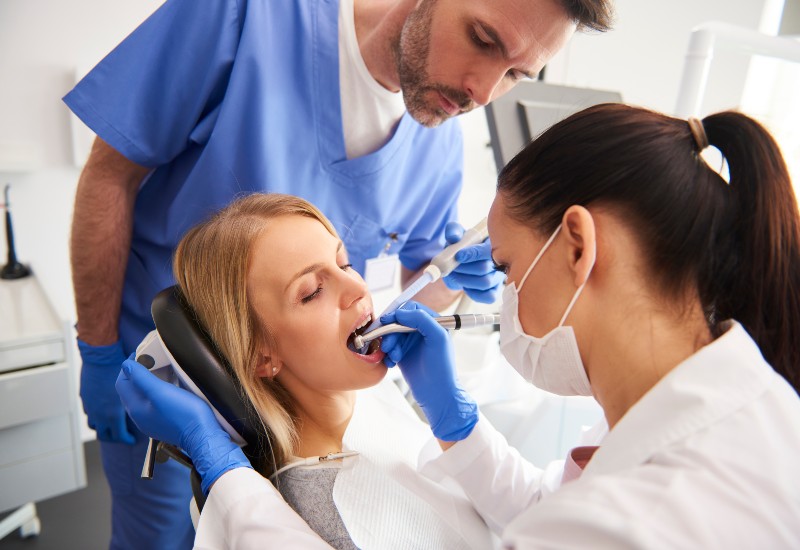Understanding the Causes and Symptoms of Impacted Wisdom Teeth
Understanding the Causes and Symptoms of Impacted Wisdom Teeth
Wisdom teeth are the final set of molars to emerge, typically appearing in late adolescence or early adulthood. For many people, these teeth erupt without issue. But for others, they become impacted, meaning they don’t have enough room to grow in properly. At James Kakos DDS, in Arlington Heights, IL, we specialize in impacted wisdom teeth diagnosis and treatment. If you experience pain, swelling, or discomfort in the back of your mouth, our team can safely remove your impacted wisdom teeth to relieve your pain and other symptoms and safeguard your oral health now and into the future.

What Are Impacted Wisdom Teeth?
You may experience impacted wisdom teeth when your third molars — located at the very back of your mouth — fail to erupt through the gums fully. This can happen because there’s not enough space in the jaw, or the teeth grow in at an angle. Instead of emerging upright like your other molars, impacted wisdom teeth may push against neighboring teeth, remain trapped beneath the gum line, or partially break through, leaving the area vulnerable to infection.
This condition isn’t just uncomfortable — it can lead to serious dental complications if left untreated.
What Causes Wisdom Teeth Impaction?
Impaction is a common dental issue, especially among teens and young adults. Most people develop wisdom teeth between the ages of 17 and 25, but by that time, the jaw has often stopped growing. If there’s insufficient room for these molars to erupt naturally, they become impacted. Because impacted wisdom teeth are so common, regular dental checkups during adolescence are crucial for early detection. Several factors contribute to this problem:
- Jaw Size – Modern human jaws are often too small to accommodate four extra molars.
- Tooth Alignment – If your existing teeth are crowded or misaligned, wisdom teeth may not have a clear path to emerge.
- Genetics – Some people are genetically predisposed to having impacted teeth.
- Late Development – Wisdom teeth that erupt later than usual may encounter more resistance from surrounding teeth.
Symptoms of Impacted Wisdom Teeth
Impacted wisdom teeth don’t always cause immediate symptoms. However, when they do, the discomfort can be hard to ignore. If you notice any of these symptoms, it’s important to consult a dental professional promptly. Below are some signs to watch for:
- Persistent Pain – A dull ache or sharp pain in the back of the mouth or jaw.
- Swelling – Inflamed gums around the affected area.
- Redness or Tenderness – Gums may appear irritated or feel sore to the touch.
- Jaw Stiffness – Difficulty opening your mouth or chewing.
- Bad Breath – Trapped food and bacteria around partially erupted teeth can lead to odor.
- Headaches or Earaches – Pain may radiate beyond the mouth.

When Should I Seek Treatment?
Impacted wisdom teeth are not something to ignore. Even if the pain seems manageable, untreated impaction can lead to more serious problems over time. At James Kakos DDS, we recommend seeking treatment as soon as symptoms appear — or even earlier if your dentist identifies potential impaction during a routine exam. Here’s why timely intervention matters:
- Prevent Infection – Impacted teeth can trap bacteria, leading to painful infections or abscesses.
- Avoid Damage to Other Teeth – Pressure from impacted wisdom teeth can shift or damage adjacent molars.
- Reduce Risk of Cysts or Tumors – In rare cases, impacted teeth can cause cysts that damage the jawbone.
- Protect Overall Oral Health – Early removal prevents complications that may require more invasive procedures later.
How Do You Treat Impacted Wisdom Teeth?
At James Kakos DDS, we understand that impacted wisdom teeth aren’t just uncomfortable — These painful molars can pose serious risks to your oral and overall health. That’s why we approach every case with the utmost precision, care, and a deep commitment to your well-being. Our Arlington Heights dental team has years of experience treating impacted wisdom teeth, and we take pride in making the process as smooth and stress-free as possible. From diagnosis to recovery, we’re here to restore your comfort and protect your smile. When it comes to treating impacted wisdom teeth, our approach is thorough and patient-focused. Here’s how dental professionals typically perform a wisdom tooth extraction:
- Initial Evaluation – We begin with a detailed exam and imaging (usually X-rays) to assess the position and severity of the impaction.
- Treatment Planning – Based on your specific case, we develop a personalized plan for safe and effective removal.
- Anesthesia Administration – Local anesthesia is used to numb the area, and sedation may be offered for added comfort.
- Surgical Extraction – The dentist makes a small incision in the gum to access the tooth, then carefully removes it — sometimes in sections to minimize trauma.
- Cleaning and Closure – The area is cleaned to prevent infection, and the gum is sutured if needed.
- Post-Op Care – You’ll receive clear instructions for recovery, including pain management and hygiene tips.
Let James Kakos DDS Resolve You Oral Health Concerns
James Kakos DDS has helped countless patients in Arlington Heights, IL find relief from the pain and complications of impacted wisdom teeth. Our team combines years of experience with a compassionate approach to ensure your treatment is smooth, effective, and tailored to your needs. Whether you experience symptoms or simply want to be proactive about your oral health, we’re ready and willing to help. Don’t wait for the pain to get worse. Reach out to us today to schedule an evaluation and take the first step toward a healthier, more comfortable smile.
